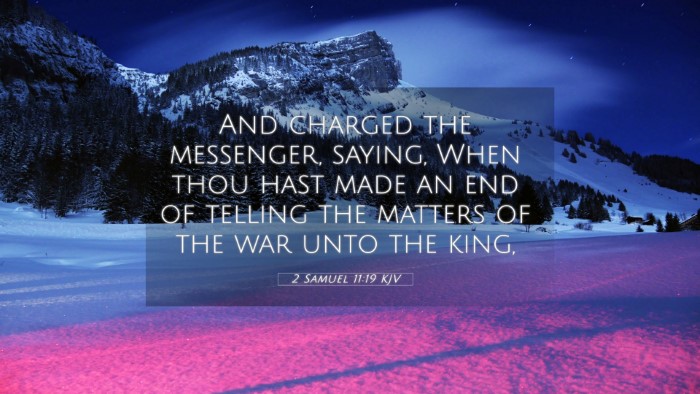Understanding 2 Samuel 11:19
Verse: 2 Samuel 11:19 states, "And charged the messenger, saying, When thou hast made an end of telling the matters of the war unto the king,
This verse is part of the narrative surrounding the events of David's sin and the subsequent fallout from the matter involving Uriah and Bathsheba. It highlights a pivotal moment in the story where the messenger is instructed on how to report back to King David regarding the outcome of a battle.
Commentary Insights
- Matthew Henry: Henry notes that this verse illustrates the calculated actions taken by David after the death of Uriah. The instructions given to the messenger show David's desire to control the narrative surrounding the battle, emphasizing his deceit and manipulation.
- Albert Barnes: Barnes explains that the messenger's report is crucial in understanding the dynamics of loyalty and truth in the royal court. The message would not only inform David of the battle's outcome but also indicate whether his plan had succeeded.
- Adam Clarke: Clarke observes that this verse captures David's deepening involvement in his sinful actions, as he needs to cover up the results of his wrongdoing. It is a reflection on how sin can corrupt not only the individual but also their relationship with others.
Bible Verse Cross-References
This verse connects with various other scripture passages that provide further insight into the themes of manipulation, betrayal, and the consequences of sin:
- 2 Samuel 11:14-15: The plot to kill Uriah and how it reveals David's moral corruption.
- 2 Samuel 12:9: Nathan's confrontation with David about his sin, leading to David's repentance.
- Psalm 51: David's heartfelt prayer of confession after his sin with Bathsheba.
- Proverbs 12:23: The wisdom hidden in the heart, contrasting with the deception practiced by David.
- Galatians 6:7: A New Testament affirmation that one reaps what they sow, echoing the inevitable consequences of David's actions.
- 1 Timothy 5:24: A reminder that the sins of some are evident and lead to judgment, akin to David's situation.
- Matthew 7:2: The principle of judgment reflecting back on the individual, applicable to David's self-inflicted consequences.
Thematic Bible Verse Connections
This verse opens up broader themes of:
- Deception: How leaders may manipulate information for personal gain or to hide wrongdoing.
- Accountability: The need for accountability in relationships, especially in leadership positions.
- Consequences of Sin: The significant ramifications sin can have on an individual and those around them.
- Leadership Integrity: Insights into the character required for true leadership rooted in truthfulness and righteousness.
Connections between Bible Verses
Understanding 2 Samuel 11:19 in conjunction with other scriptures enhances the reader's grasp of the recurring themes in the Bible. The connections can be seen as a dialogue between various biblical accounts:
- Nathan's Rebuke (2 Samuel 12): Highlights the consequences that follow David's manipulation.
- Jesus's Teachings on Integrity (Matthew 5:37): A call to honesty echoing across the ages.
- Confession and Repentance (1 John 1:9): A powerful New Testament reminder of the process of returning to God.
Conclusion
2 Samuel 11:19 serves as a significant teaching point within the narrative of King David's life. It reflects the moral decay associated with hidden sin and manipulation, offering lessons about integrity, accountability, and the far-reaching consequences of one’s actions. By cross-referencing this verse with others, readers can gain a richer understanding of Biblical themes and the interconnectedness of God's Word.


